Argentina is highly likely to slip into default this month, analysts have told CNBC, as the crisis-prone South American country enters a critical period of make-or-break talks with international creditors.
Argentina's government submitted a proposal to restructure $65 billion of its foreign debt last month. The offer, which expires on Friday, has already been rejected by a group of major asset managers.
Separately, a grace period for a $500 million group of interest payments on three foreign bonds is set to end on May 22. If no deal is reached and payment is not made, this could see Argentina fall into default for the third time in just two decades.
It comes nearly five months into President Alberto Fernandez's administration. The grains producer, which was already grappling with a two-year recession, sky-high inflation rates and a mounting debt crisis, has been under national lockdown since March 20.
How did we get here?
Earlier this week, Economy Minister Martin Guzman told the Financial Times that the country was willing to consider defaulting on $65 billion of foreign debt unless investors agreed to recent negotiations. He cited the coronavirus pandemic as a reason why Argentina would be unable to pay an insurmountable level of debt.
"As anticipated, we expect Argentina to prefer a default that can be domestically blamed on the Covid-19-enhanced recession," Jimena Blanco, head of Latin America at Verisk Maplecroft, told CNBC via telephone.
Speaking from Buenos Aires, Blanco said she believed a new default was now "a matter of time." The political risk consultancy forecast an 89% probability that the country would register its ninth sovereign debt default before year-end.

On Tuesday, a post appeared on the economy ministry's website appearing to outline some of the details about talks with creditors dating back to December 2019.
"For us, that confirms the political strategy of the government," Blanco said. "We see it as laying the groundwork for having a political answer when the default hits."
"It is continuing to negotiate with bondholders but, to us, the publication of documentation that was intended to be confidential now undermines any trust that could have been there — and trust levels were already low," Blanco said.
"If you shatter trust then what do you have left to negotiate?" she added.
Another default would make it 'difficult' to rebuild trust
Argentina also owes a significant amount to the International Monetary Fund, which has supported the country's debt negotiations. However, Argentina's Guzman told Reuters earlier this week that the country had missed a $2.1 debt payment to the Paris Club.
It had requested a one-year postponement to the payment, which was due on May 5, although it is not yet clear whether the group has agreed. The Paris Club is an informal group of 19 permanent members who tend to meet each month in the French capital city to try to find workable solutions to payment problems faced by debtor nations.
In 2001, Argentina defaulted on around $100 billion of debt. It triggered the worst economic crisis in the country's history and resulted in millions of middle-class citizens falling into poverty — a consequence many in Argentina blame on the fiscal policies enforced by the IMF at the time.
The current administration is attempting to orchestrate a delicate balancing act. The Peronist coalition of Fernandez and Vice-President Cristina Fernandez de Kirchner has vowed to refuse to agree to the kind of budget cuts the IMF usually insists on for crisis-hit countries, but it is also desperate to restructure commitments with its single biggest creditor.
"We think there is a high risk of at least a temporary initial default, even if negotiations with creditors are ongoing," Carla Selman, senior Latin America analyst at IHS Markit, told CNBC via email.
"The government is saying that they are offering what they can actually pay, stressing that their debt is unsustainable and that they simply cannot pay in the coming years, that's why they are asking for debt moratorium," Selman said, warning another default would make it "difficult" for the country to rebuild trust among international creditors.
Coronavirus crisis
Argentina has imposed stringent measures in an effort to slow the spread of the coronavirus outbreak.
It has seen the country record far fewer cases and deaths than neighboring Brazil, which has seen its leader, President Jair Bolsonaro, come under fire from across the political spectrum for repeatedly dismissing the threat of the virus.
To date, Argentina has recorded 5,208 cases of the coronavirus, with 273 deaths, according to data compiled by Johns Hopkins University. Meanwhile, Brazil has reported 126,611 cases and 8,588 fatalities as a result of the virus.
The IMF expects Argentina's gross domestic product to contract by 5.7% this year, before recording 4.4% growth in 2021.
Argentina's economy ministry did not respond when contacted by CNBC to comment for this article.


